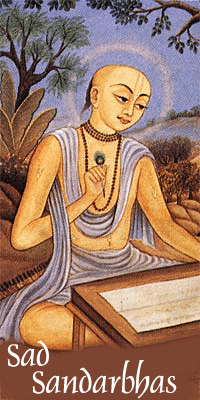
BY: SUN STAFF
Jun 15, CANADA (SUN) —
Sri Krsna-sandarbha
by Srila Jiva Goswami
Anuccheda 87
1 Now we shall describe Pradyumna, who in His previous life as Cupid was burned to ashes by the anger of Lord Siva. This Pradyumna is described in the following verse from the Gopala-tapani Upanisad (2.40):
2 “Lord Krsna, accompanied by His three potencies, and by Balarama, Pradyumna, Aniruddha and Rukmini, stays in delightful Mathura-puri.”
3 This Pradyumna, however, cannot be considered to be the same Pradyumna who is one of the four original expansions of Lord Krsna (Vasudeva, Sankarsana, Pradyumna, and Aniruddha).
This Pradyumna is simply the demigod Cupid, who is an ordinary living entity, and not the Personality of Godhead. This is described in Srimad Bhagavatam (10.55.1):
4 “It is said that Cupid, who is directly part and parcel of Lord Vasudeva, was formerly burned to ashes by the anger of Lord Siva. In order to get his body again, he took birth as the son of Krsna.”*
5 The word ‘tu’ (but) is very significant in this verse. This word is used to specifically distinguish a certain person or thing from another or others. For example, if we say ‘but he is a brahmana’, a certain person is distinguished from others, as for example if we say ‘there may be many who although born in a brahmana family remain ignorant and uneducated, but he is a brahmana’, the word ‘but’ distinguishes the learned brahmana from others who are less qualified.
In this verse the phrase ‘kamas tu vasudevamsah’ (but that Cupid who is directly part and parcel of Lord Vasudeva) indicates that there are two Cupids, and one of them is directly part and parcel of Lord Vasudeva. If it were otherwise, and the intention of the author had been to say ‘but Cupid is directly part and parcel of Lord Vasudeva’, the order of the words (in Sanskrit) would have been ‘vasudevamsas tu kamah’.
The other Cupid (who is not directly part and parcel of Lord Vasudeva) is described in the second part of this verse. He is the material Cupid, an ordinary demigod, one of the eleven Rudras, and servant of Maharaja Indra. Burned by Lord Siva’s anger, this material Cupid lost his body and became disembodied. In order to get his body again he entered the body of Lord Pradyumna, the original Cupid, who is directly part and parcel of Lord Vasudeva. The material Cupid was then born again from the body of Lord Pradyumna.
Interpreted in this way, this verse from Srimad Bhagavatam may be translated in the following words:
“It is said that Cupid was formerly burned to ashes by the anger of Lord Siva. In order to get his body again he entered the body of Lord Pradyumna, the original Cupid, who is a direct expansion of Lord Vasudeva.”
Another explanation of this verse may be given by dividing the first two lines in the following way:
By accepting the word ‘adagdhah’ to replace ‘dagdhah’, we may translate this verse in this way:
“The original Cupid, who is directly part and parcel of Lord Vasudeva (and different from the material Cupid), was not burned to ashes by the anger of Lord Siva. This original Cupid entered the body of Lord Vasudeva to appear with Him as He manifested His transcendental pastimes within the material world.”
In this way we have described the original cupid, Lord Pradyumna, who, because He is directly the expansion of Lord Vasudeva, must be different from the material Cupid, who was burned to ashes by the anger of Lord Siva.
Go to Anuccheda Eighty-eight
Return to Anuccheda Eighty-five to Eighty-six
